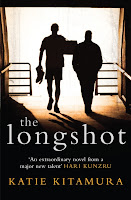‘The country was in turmoil. And there was besides: sickness
and growing and dying. How could they do anything but give in, to what was
obvious, rather than what was good? In the face of that accumulation.’
Katie
Kitamura’s debut novel, The Longshot, was
one of the unexpected delights that come along only too rarely. The story of
the final fight by a not-quite brilliant Mixed Martial Arts fighter, it managed
to recreate the computer game feeling of having an opponent reach into my
chest, pluck my heart out, and holding it aloft, gently squeezing it, from
first sentence to final image. It revealed Kitamura as a brilliant writer in
her own right; and an air to the minimalist legacy of Hemingway, McCarthy and Coertzee.
Gone to the Forest (The Clerkenwell Press, 2013) confirms
such comparisons as entirely appropriate. With sharp, slashing prose and perfectly
balanced storytelling, Kitamura explores the death throes of colonialism in a
nameless nation.
Tom and
his father live on a large rural farm. Ever since he came to the country, the
old man has bent everything to him. His unremitting desire, big personality,
and ruthless control ensure the farm has been successful, all those around him
reliant on him for their safe orbit. But now disruption and native rebellion in
the country threatens all he has built, and ill health begins to catch up with
him. Tom, cowering in his father’s shadow, has eyes only for the land. It is
all he has known. Other farmers circle, danger looms. And when a woman named
Carine arrives, the future – whatever it holds – begins to bear down upon them.
In a
chapter of pounding intensity, Kitamura brings these man-made tensions together
in the midst of a massive volcanic eruption. Fire and brimstone filling the
sky. Blocking out the sun. Then covering the land in ash that falls
relentlessly. Sending animals wild and driving people to recklessness. It’s a
powerful metaphor, the earth purging itself of colonial rule. The cataclysm
that births a new age. Identities are questioned, relationships strained.
There’s
much Coetzee here, a sort of mix of the wild frontiers of Waiting for the Barbarians and the search for peace away from
troubled times of Life and Times ofMichael K. What is particularly clever is the way that Kitamura subtly
questions notions of affinity with a landscape. Where much literature associates
native peoples with affinity for the land, here it the character of Tom – slow,
passive, uncertain; Michael K with privilege – who longs for nothing other than
to escape people and live in peace with the landscape. But he is less
resourceful than Michael K. Where Coetzee’s character bends a spoon to a
natural well and drinks a thimble full at a time – ‘in that way, one can live’ –
one does not have the feeling Tom would survive long. And his father’s health
is rapidly failing.
On the
other hand, the natives here ‘do not believe in property until it is theirs’,
at which point they subject it entirely to their will. Cut it up into little
pieces. This is the story of the colonialists, but that is not to say that this
is a pro-colonial book. It is not pro-anything. Merely presents a series of
characters in a fresh light, and the tragedies of upheaval.
Gone to the Forest is a tense, expertly controlled
novel. One to read in one sitting. It is short, and the prose races along at a
pace not even change can keep up with. Katie Kitamura is one of the most
exciting voices in contemporary writing, and this is a marvellous addition to
the already heaving realms of colonial/post colonial literature. If writers
made swords, Kitamura would be the sort fabled in a Tarantino film. You will
not find sharper, finer minimalist prose anywhere.





